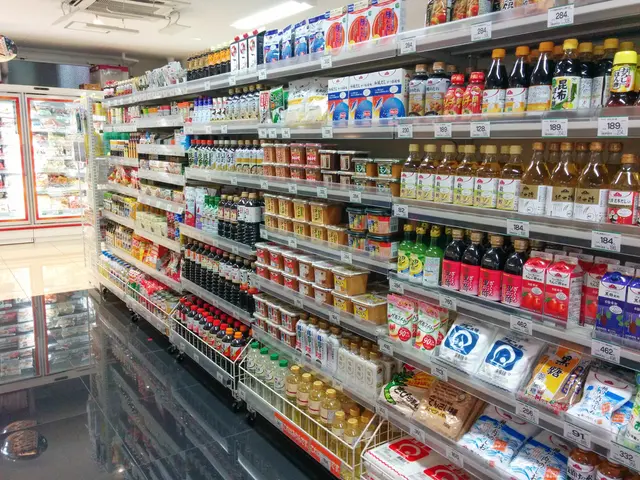Upping the Game: China's Spirit of Resilience and Southeast Asia's New Trade Landscape
- *
Imports see an increase of 8.1% in China's export figures for April; however, exports to the U.S. witness a contraction. - Rise of Chinese Exports by 8.1% in April, with Exports to the US Experiencing a Decline
Stakes have been raised on the global board as China plays a strategic game of economic adaptation in the face of escalating tariffs with the US. This section reveals China's moves to shift its export dynamics and the ripple effects on Southeast Asia.
China's Strategic Shifts: Surviving and Thriving Amid US Tariffs
- Rebalancing Portfolios: China has been proactively re-allocating its export markets to minimize dependence on the US. This diversification involves boosting trade with regions like Europe, Southeast Asia, and other parts of the world.
- Maneuvering Around Tariffs: There have been whispers of Chinese exporters utilizing sneaky tactics such as indirect routes or misclassifying products to sidestep tariffs. An example could be shipping goods through intermediary countries before they reach the US.
- Economic Modernization: China has been steering towards structural reforms to strategically upgrade its industries. The goal is to build a more technology-focused economy, thereby maintaining its competitive edge despite tariffs.
- FTAs: The New Frontier: China has been actively seeking Free Trade Agreements (FTAs) with various countries and regions. The Regional Comprehensive Economic Partnership (RCEP) is an example, encompassing several Southeast Asian countries, offering preferential trade conditions.
Southeast Asia's Role in the New Global Trade Scenario
- Economic Windfall: With China's diversification efforts, Southeast Asian countries witness an uptick in trading opportunities with China. Many nations in the region are experiencing a surge in Chinese investment and commerce.
- Supply Chain Shifts: Some Southeast Asian nations find themselves in the thick of it as companies relocate or set up new manufacturing facilities in these countries to bypass US tariffs. This has caused a spike in foreign direct investment (FDI) in countries like Vietnam and Thailand.
- Competition Conundrum: The tide of Chinese investment and products can prove to be a double-edged sword for domestic industries in Southeast Asia. They might face stiff competition from more established and often subsidized Chinese companies.
- Geopolitical Tango: The trade tensions and China's counteractions have intensified regional geopolitical dynamics. Southeast Asian countries must deftly manage delicate ties with both the US and China while navigating their own economic interests.
In essence, while China's cunning moves aiming to bypass US tariffs open doors for trade opportunities for Southeast Asian countries, they also introduce challenges that necessitate shrewd economic and diplomatic strategies.
Analysts had projected exports to increase by merely two percent in April, but to their surprise, China's exports surged by 8.1 percent. This unexpected rise, according to experts, indicates that China has smoothly redirected most of its exports to Southeast Asia to escape the heavy U.S. tariffs. Customs reports confirm a doubling of exports to Thailand, Indonesia, and Vietnam. President Trump had at one point imposed high tariffs on these countries, albeit temporarily.
"World-class supply chains are being rearranged on-the-fly," notes analyst Stephen Innes of SPI Asset Management. "It seems that Vietnam is turning into China's offshore haven for US-bound goods." Analyst Zhiwei Zhang of Pinpoint Asset Management also credits the strong April figures to "shifts to other countries." However, he foresees the numbers gradually decreasing in the ensuing months.
U.S. President Donald Trump has imposed tariffs of 145 percent on almost all imports from China, with some goods facing even steeper increases. These tariffs took effect in early April, prompting Beijing to retaliate with tariffs of 125 percent on U.S. goods.
High-level trade talks between China and the US are scheduled for this weekend in Switzerland, in the picturesque town of Geneva. Chinese Vice Premier He Lifeng will engage with U.S. Treasury Secretary Scott Bessent and U.S. Trade Representative Jamieson Greer. On Wednesday, Bessent told Fox News that he anticipates the initial conversations to focus on possible "de-escalation." A trade agreement is not on the table at present.
Economists consider the present state of the US-China trade war to be unsustainable. Tariffs higher than 100 percent are equivalent to an embargo, Bessent also stated. China's customs also revealed the country's April imports, which surprisingly dipped by 0.2 percent year-on-year - defying the analysts' expectations of a decline of six percent.
Since the end of the COVID-19 crisis, the People's Republic has confronted weak domestic consumption. In response, the central bank announced on Wednesday that it would beef up credit growth and lower the mortgage rate for first-time homebuyers.
- The Commission, in response to the global trade tensions, has also adopted a proposal for a Council regulation on the approximation of the laws of the Member States relating to the labelling of foodstuffs, aiming to keep up with the growing influx of Chinese products in the European market.
- The sudden surge in Chinese exports to Southeast Asian countries like Thailand, Indonesia, and Vietnam, despite the higher tariffs imposed by the US, indicates a strategic shift in China's export dynamics, with the region becoming a vital offshore haven for US-bound goods.
- Businesses and industries in Southeast Asia have welcomed the increased Chinese investment and commerce, but they also fear the potential escalation in competition due to the influx of established Chinese companies and products.
- As the US doubles down on high tariffs, politics and finance are closely monitoring the developments, with analysts such as Stephen Innes of SPI Asset Management and Zhiwei Zhang of Pinpoint Asset Management keeping a keen eye on the trade dynamics between China and the US.
- Meanwhile, the general news landscape is abuzz with conversations about the US-China trade war, its impact on businesses, and the potential solutions, with high-level talks scheduled between Chinese and US delegates in Geneva this weekend.








